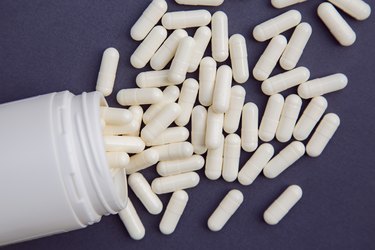
Spring Valley vitamins are the store brand sold exclusively at Walmart — although they're frequently confused with a small Missouri herb store of the same name. Spring Valley vitamins are affordable and widely available, but have also attracted enormous controversy in recent years.
Hundreds of different Spring Valley supplements remain available in Walmart stores and online, but have been stripped of "third-party verified" labeling that was deemed potentially misleading.
Video of the Day
Video of the Day
Controversy for Spring Valley Products
In a study published in an October 2013 issue of BMC Medicine, researchers from the University of Guelph, Ontario, used DNA barcoding to evaluate the authenticity of 44 different herbal products from 12 supplement companies.
The study findings were shocking: 59 percent of the products tested contained DNA from plant species not listed on the label, and 30 out of the 44 products had no trace of the labeled main ingredient, but contained other products not listed on the label.
Of the 12 supplement companies whose products were involved in the test, only two of them had products with no substitution, contamination or fillers. Although the researchers didn't name the supplement companies, Forbes reported that Walmart's Spring Valley vitamins were included among the negative results, and printed a reaction from Walmart that confirmed this.
Aside from the simple and reasonable expectation of getting what you pay for is the fact that researchers in the aforementioned study noted that some of the contaminants they found pose serious health risks to consumers because of interactions with medications, allergies and contamination from ingredients that can cause harmful side effects with prolonged use.
The researchers also cited a 2004 statement from the World Health Organization, in which the WHO notes that adulteration of consumer products is a genuine threat to consumer safety.
Further Controversy for Spring Valley
The New York Attorney General's office also conducted an investigation into supplement safety, perhaps spurred by the aforementioned study. Although the New York Attorney General's original press release is no longer available online, CBS News reported that Walmart's Spring Valley house brand had the worst showing of all the companies evaluated, with only 4 percent of their products showing DNA from the plants they were supposed to contain.
An online supplement industry magazine reported that, per a statement from Walmart, in 2014 the company began removing the "verified by an independent, certified laboratory" statement from new labels on its Spring Valley products. The process was reportedly complete as of 2016. Per the same source, Walmart also provided $100,000 to the Iowa Attorney General's office — which reportedly had a hand in spurring the change in labels — for refunds to consumers in that state.
Other Supplement Choices
Given the concerning research results for the Walmart Spring Valley brand, what other brands should you consider? Two of the store brands in the BMC Medicine study showed 100 percent accuracy in their labeling — but unfortunately, the researchers don't identify which brands those were.
However, you can increase your odds of getting the right product by looking for reputable third-party certification seals on the labels of top vitamin brands. Consumer Reports, a long-standing consumer advocacy group, didn't compare testing procedures — but did give an overview of the four companies you can expect to see offering third-party certifications: ConsumerLab.com, NSF International, U.S. Pharmacopeia and Underwriters Laboratory (UL).
Of these, ConsumerLab.com, U.S. Pharmacopeia and UL exclusively use samples purchased in stores, as opposed to provided by the manufacturer, which means they're testing the products you may actually buy. All four companies also collect a fee of several thousand dollars from the manufacturer for each product certified.
Both the National Institutes of Health Office of Dietary Supplements and the National Center for Complementary and Integrative Health offer science-backed fact sheets that can help you choose the right herbal supplements for you. And, as always, be sure to discuss any herbal supplements with your doctor, because they can produce unexpected interactions with certain medical conditions and medications, including antidepressants.
- Spring Valley Herbs and Vitamins: "Spring Valley Herbs Questions and Answers"
- BMC Medicine: "DNA Barcoding Detects Contamination and Substitution in North American Herbal Products"
- Forbes: "Cease-and-Desist Orders Hit Walmart, Walgreens and Others for Herbal Supplement Sales"
- World Health Organization: "WHO Guidelines on Safety Monitoring of Herbal Medicines in Pharmacovigilance Systems"
- CBS News: "Herbal Supplements Filled With Fake Ingredients, Investigators Find"
- Nutra Ingredients-USA.com: "Walmart to Eliminate 'Independent Verification' Statement From Spring Valley Supplements"
- Consumer Reports: "How to Choose Supplements Wisely"
- National Institutes of Health Office of Dietary Supplements: "Dietary Supplement Fact Sheets"
- National Center for Complementary and Integrative Health: "Herbs at a Glance"